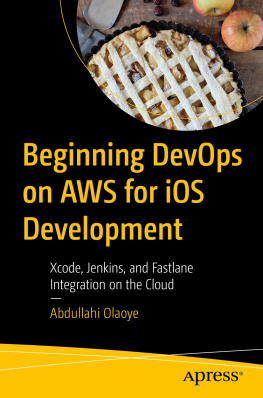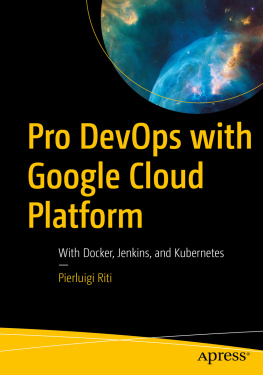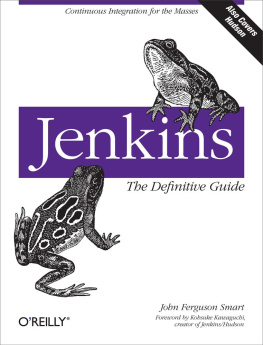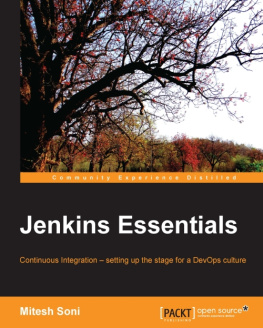Dr. Alex Blewitt
About the Author
Alan Mark Berg , Bsc, MSc, PGCE, has been the lead developer at the Central Computer Services at the University of Amsterdam for the last 12 years. In his famously scarce spare time, he writes. Alan has a degree, two Master's, and a teaching qualification. He has also co-authored two books about Sakai (http://sakaiproject.org) a highly successful open source learning management platform used by many millions of students around the world. Alan has also won a Sakai Fellowship.
In previous incarnations, Alan was a technical writer, an Internet/Linux course writer, a product line development officer, and a teacher. He likes to get his hands dirty with the building and gluing of systems. He remains agile by ruining various development and acceptance environments.
I would like to thank Hester, Nelson, and Lawrence. I felt supported and occasionally understood by my family. Yes, you may pretend you don't know me, but you do. Without your unwritten understanding that 2 a.m. is a normal time to work and a constant supply of sarcasm is good for my soul, I would not have finished this or any other large-scale project.
Finally, I would like to warmly thank the Packt Publishing team, whose consistent behind the scenes effort improved the quality of this book.
About the Reviewers
Dr. Alex Blewitt is a technical architect, working at an investment bank in London. He has recently won an Eclipse Community Award at EclipseCon 2012 for his involvement with the Eclipse platform over the last decade. He also writes for InfoQ and has presented at many conferences. In addition to being an expert in Java, he also develops for the iOS platform, and when the weather's nice, he goes flying. His blog is at http://alblue.bandlem.com, and he can be reached via @alblue on Twitter.
Florent Delannoy is a French software engineer, now living in New Zealand after graduating with honors from a MSc in Lyon. Passionate about open source, clean code, and high quality software, he is currently working on one of New Zealand's largest domestic websites with Catalyst I.T. in Wellington.
I would like to thank my family for their support and my colleagues at Catalyst for providing an amazingly talented, open, and supportive workplace.
Michael Peacock (www.michaelpeacock.co.uk) is an experienced senior/lead developer and Zend Certified Engineer from Newcastle, UK, with a degree in Software Engineering from the University of Durham.
After spending a number of years running his own web agency, managing the development team, and working for Smith Electric Vehicles on developing its web-based vehicle telematics platform, he currently serves as head developer for an ambitious new start-up: leading the development team and managing the software development processes.
He is the author of Drupal 7 Social Networking, PHP 5 Social Networking, PHP 5 E-Commerce Development, Drupal 6 Social Networking, Selling online with Drupal E-Commerce , and Building Websites with TYPO3 . Other publications in which Michael has been involved include Mobile Web Development and Drupal for Education and E-Learning , both of which he acted as technical reviewer for.
Michael has also presented at a number of user groups and conferences including PHPNE, PHPNW10, CloudConnect, and ConFoo,
You can follow Michael on Twitter: www.twitter.com/michaelpeacock, or find out more about him through his blog: www.michaelpeacock.co.uk.
www.PacktPub.com
Support files, eBooks, discount offers, and more
You might want to visit www.PacktPub.com for support files and downloads related to your book.
Did you know that Packt offers eBook versions of every book published, with PDF and ePub files available? You can upgrade to the eBook version at >for more details.
At www.PacktPub.com, you can also read a collection of free technical articles, sign up for a range of free newsletters and receive exclusive discounts and offers on Packt books and eBooks.
http://PacktLib.PacktPub.com
Do you need instant solutions to your IT questions? PacktLib is Packt's online digital book library. Here, you can access, read, and search across Packt's entire library of books.
Why Subscribe?
- Fully searchable across every book published by Packt
- Copy and paste, print, and bookmark content
- On demand and accessible via web browser
Free Access for Packt account holders
If you have an account with Packt at www.PacktPub.com, you can use this to access PacktLib today and view nine entirely free books. Simply use your login credentials for immediate access.
Preface
Jenkins is a Java-based Continuous Integration (CI) server that supports the discovery of defects early in the software cycle. Thanks to over 400 plugins, Jenkins communicates with many types of systems, building and triggering a wide variety of tests.
CI involves making small changes to software, and then building and applying quality assurance processes. Defects do not only occur in the code but also appear in the naming conventions, documentation, how the software is designed, build scripts, the process of deploying the software to servers, and so on. Continuous integration forces the defects to emerge early, rather than waiting for software to be fully produced. If defects are caught in the later stages of the software development lifecycle, the process will be more expensive. The cost of repair radically increases as soon as the bugs escape to production. Estimates suggest it is 100 to 1000 times cheaper to capture defects early. Effective use of a CI server, such as Jenkins, could be the difference between enjoying a holiday and working unplanned hours to heroically save the day. As you can imagine, in my day job as a Senior Developer with aspirations to Quality Assurance, I like long boring days, at least for mission-critical production environments.













